Top Rankings
Bloomingdale SD 13 School District ranks among the top 20% of public school district in Illinois for:
Category
Attribute
Overall Rank
Highest overall rank (Top 10%)
Math Proficiency
Highest math proficiency (Top 20%)
Reading/Language Arts Proficiency
Highest reading/language arts proficiency (Top 5%)
Science Proficiency
Highest science proficiency (Top 5%)
For the 2025 school year, there are 3 public schools serving 1,314 students in Bloomingdale SD 13 School District. This district's average testing ranking is 10/10, which is in the top 10% of public schools in Illinois.
Public Schools in Bloomingdale SD 13 School District have an average math proficiency score of 45% (versus the Illinois public school average of 26%), and reading proficiency score of 64% (versus the 30% statewide average).
Minority enrollment is 32% of the student body (majority Asian), which is less than the Illinois public school average of 56% (majority Hispanic).
Overview
This School District
This State (IL)
# Schools
3 Schools
4,399 Schools
# Students
1,314 Students
1,881,773 Students
# Teachers
94 Teachers
136,664 Teachers
Student : Teacher Ratio
14:1
14:1
District Rank
Bloomingdale SD 13 School District, which is ranked within the top 10% of all 844 school districts in Illinois (based off of combined math and reading proficiency testing data) for the 2020-2021 school year.
Overall District Rank
#53 out of 852 school districts
(Top 10%)
(Top 10%)
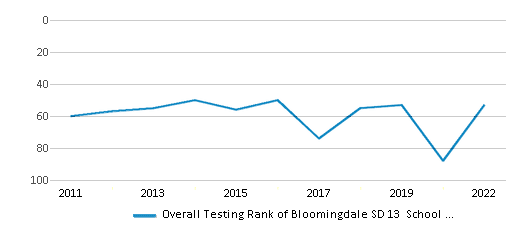
Math Test Scores (% Proficient)
(20-21)45%
28%
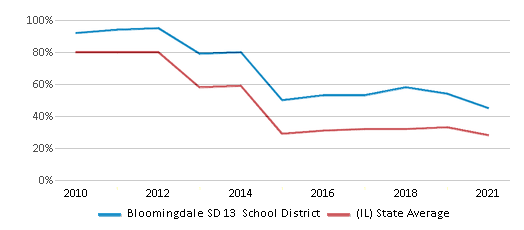
Reading/Language Arts Test Scores (% Proficient)
64%
30%
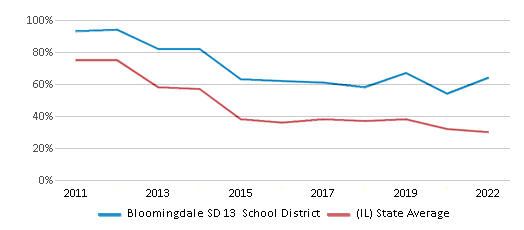
Science Test Scores (% Proficient)
81%
50%
Students by Ethnicity:
Diversity Score
0.50
0.70
# American Indian Students
13 Students
4,556 Students
% American Indian Students
1%
1%
# Asian Students
253 Students
103,630 Students
% Asian Students
19%
6%
# Hispanic Students
105 Students
517,685 Students
% Hispanic Students
8%
28%
# Black Students
18 Students
303,129 Students
% Black Students
1%
16%
# White Students
889 Students
837,178 Students
% White Students
68%
45%
# Hawaiian Students
1 Student
1,684 Students
% Hawaiian Students
n/a
n/a
# Two or more races Students
35 Students
78,057 Students
% of Two or more races Students
3%
4%
Students by Grade:
# Students in PK Grade:
24
79,660
# Students in K Grade:
84
120,716
# Students in 1st Grade:
110
126,380
# Students in 2nd Grade:
139
167,371
# Students in 3rd Grade:
160
130,316
# Students in 4th Grade:
152
130,337
# Students in 5th Grade:
149
129,914
# Students in 6th Grade:
178
132,189
# Students in 7th Grade:
147
135,696
# Students in 8th Grade:
171
137,626
# Students in 9th Grade:
-
149,483
# Students in 10th Grade:
-
150,499
# Students in 11th Grade:
-
146,819
# Students in 12th Grade:
-
144,755
# Ungraded Students:
-
12
District Revenue and Spending
The revenue/student of $18,642 in this school district is less than the state median of $21,990. The school district revenue/student has stayed relatively flat over four school years.
The school district's spending/student of $16,858 is less than the state median of $21,244. The school district spending/student has stayed relatively flat over four school years.
Total Revenue
$25 MM
$41,381 MM
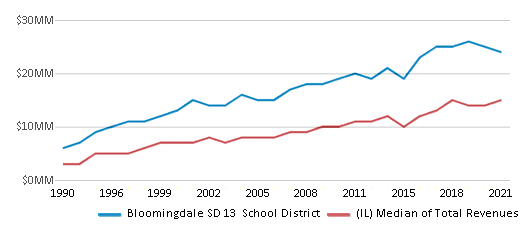
Spending
$22 MM
$39,976 MM
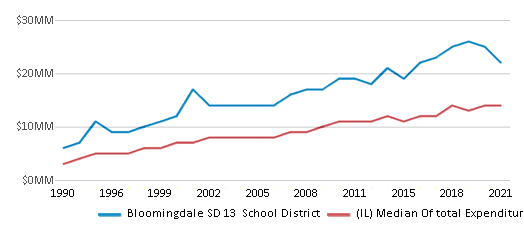
Revenue / Student
$18,642
$21,990
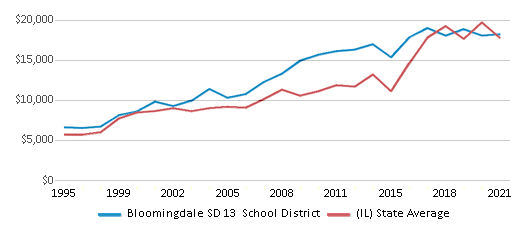
Spending / Student
$16,858
$21,244
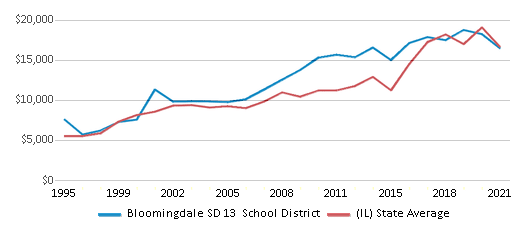
Best Bloomingdale SD 13 School District Public Schools (2025)
School
(Math and Reading Proficiency)
(Math and Reading Proficiency)
Location
Grades
Students
Rank: #11.
Erickson Elementary School
Rank:
10/
Top 10%10
277 Springfield Dr
Bloomingdale, IL 60108
(630) 529-2223
Bloomingdale, IL 60108
(630) 529-2223
Grades: PK-5
| 448 students
Rank: #22.
Westfield Middle School
Rank:
10/
Top 10%10
149 Fairfield Way
Bloomingdale, IL 60108
(630) 529-6211
Bloomingdale, IL 60108
(630) 529-6211
Grades: 6-8
| 496 students
Rank: #33.
Dujardin Elementary School
Rank:
10/
Top 10%10
166 Euclid Ave
Bloomingdale, IL 60108
(630) 894-9200
Bloomingdale, IL 60108
(630) 894-9200
Grades: PK-5
| 370 students
Frequently Asked Questions
How many schools belong to Bloomingdale SD 13 School District?
Bloomingdale SD 13 School District manages 3 public schools serving 1,314 students.
What is the rank of Bloomingdale SD 13 School District?
Bloomingdale SD 13 School District is ranked #52 out of 844 school districts in Illinois (top 10%) based off of combined math and reading proficiency testing data for the 2020-2021 school year. This district ranks in the top 20% of Illinois school districts for: Highest overall rank (Top 10%), Highest math proficiency (Top 20%), Highest reading/language arts proficiency (Top 5%) and Highest science proficiency (Top 5%)
What is the racial composition of students in Bloomingdale SD 13 School District?
68% of Bloomingdale SD 13 School District students are White, 19% of students are Asian, 8% of students are Hispanic, 3% of students are Two or more races, 1% of students are American Indian, and 1% of students are Black.
What is the student/teacher ratio of Bloomingdale SD 13 School District?
Bloomingdale SD 13 School District has a student/teacher ratio of 14:1, which is equal to the Illinois state average of 14:1.
What is Bloomingdale SD 13 School District's spending/student ratio?
The school district's spending/student of $16,858 is less than the state median of $21,244. The school district spending/student has stayed relatively flat over four school years.
Recent Articles

Year-Round Or Traditional Schedule?
Which is more appropriate for your child? A year-round attendance schedule or traditional schedule? We look at the pros and cons.

Why You Should Encourage Your Child to Join a Sports Team
Participating in team sports has a great many benefits for children, there is no doubt. In this article you will learn what those benefits are.

White Students are Now the Minority in U.S. Public Schools
Increasing birth rates among immigrant families from Asia and Central and South America, combined with lower birth rates among white families, means that for the first time in history, public school students in the United States are majority-minority. This shift in demographics poses difficulties for schools as they work to accommodate children of varying language abilities and socio-economic backgrounds.





